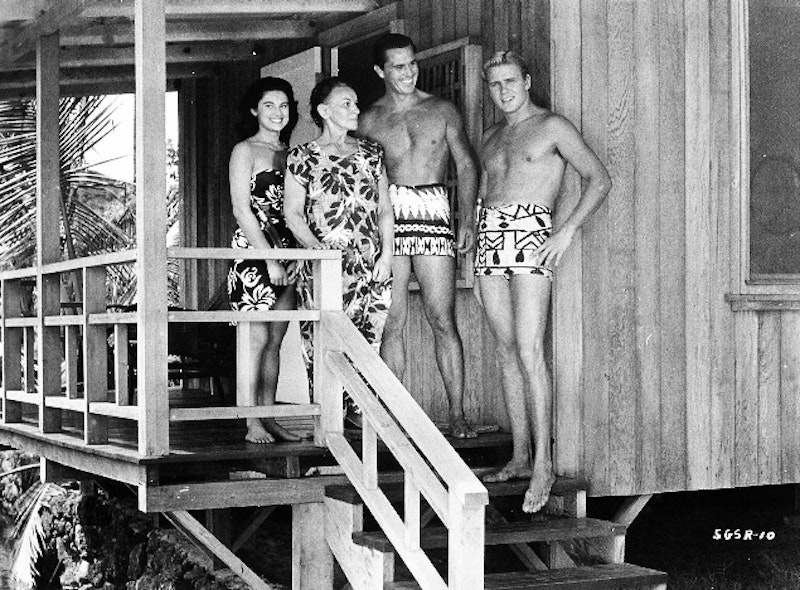Roger Corman said that his 1958 film, She Gods of Shark Reef, was one of the most enjoyable experiences he had as a film director. It’s not hard to see why: it was filmed in Hawaii, on the island of Kauai, filled with many beautiful women—the eponymous “she gods.”
The film tells a story of two brothers, Chris and Lee, who are caught in the storm on the reef. They’re pulled under by the power of water and wind, and just as they’re about to be killed and eaten by the sharks, the two brothers are rescued by beautiful women. It sounds like a recipe for pleasure island, the male fantasy of being “in care” of many women, looking after all their needs.
But life on the island gets complicated. Corman creates a dichotomy between the two brothers—Chris is “good” and Lee is “bad.” Lee’s trying to escape the authorities because he killed a man. He likes to use people, including his own brother. Chris, on the other hand, is sensitive, and unlike Lee, he’s not interested in life of perpetual crime and get rich quick schemes. However, he gets entangled in Chris’ bad decisions simply because of brotherly love.
The island may be filled with beautiful women but this beauty doesn’t necessarily translate into goodness and order. The girls are overseen by Pua, an older woman, who looks more like an old biddy or gossiping matron rather than the god-like female leader. She keeps the girls locked into the ancient superstitious beliefs.
In reality, Pua employs tactics to keep the girls on the island for one purpose—collecting pearls from the ocean. An unnamed company regularly visits the island and takes the collected pearls. Pua merely uses the ancient superstitions for the purposes of labor. She has enslaved them just as she is enslaved by the “big company.”
Chris and Lee find an abandoned boat and decide to leave the island. However, Chris has fallen in love with one of the island girls, Mahia. She’s everything you might expect—beautiful, calm, seductive, and presumably a virgin, ready to be plucked and enjoyed. Chris does have good intentions but Pua couldn’t care less about that. She unilaterally decides that Mahia has put a curse on the whole island by choosing Chris, and for that, she must be sacrificed to the shark god.
There’s a small indication that Pua too believes her own superstitious lies but she’s more driven by corruption, exploitation, and questionable capitalism than by loyalty to some primitive religion.
It’s not clear why Mahia wants to leave the island so easily until she is chosen to be sacrificed. Perhaps it’s not Chris who has been seduced by her, but the other way around. Does he represent another world, more attractive to Mahia than the boredom of pearl hunting? Does she represent an appetite that Chris could never have experienced outside the confines of the island? Are these two lives completely incompatible? Are both Chris and Mahia chasing dreams that will inevitably turn into nightmares?
Lee’s “badness” gets punished. Whether it’s God, gods, or some other strange supernatural entity, Lee gets what he deserves. Not only is he on the run for murder, he has always chosen the easy way out, and the time spent on the island is no exception. As he attempts to steal the pearls that have been collected by the girls, he’s pulled into the water, and attacked by a shark. Despite the fact that earlier he has tried to kill his own brother, Chris still tries to save him but fails.
Mahia still has a choice at the end—go back to the island and live under the dewy, palm-ensconced tyranny of Pua and slavish exploitation, or leave with Chris into the unknown and uncertain world that will surely change her. As Chris and Mahia get into the boat, looking beyond the surface of the water, they’re accosted by the women of the island, including Pua. But Mahia is resolute in her decision, and implores Chris to go, to leave behind the evil that exists on the island.
Mahia’s not aware that evil lurks on the land as much as in the deep sea, and maybe even love she feels for Chris can’t protect her. She Gods of Shark Reef may be a stilted film, and doesn’t carry the depth of Corman’s Sorority Girl, however, there are bigger ideas at play, which are visible even through the slow and unnatural acting. Once again, there’s a sense that Corman has captured a sliver of American culture as well as an exploration of strange “otherness,” whether on the land or sea.

